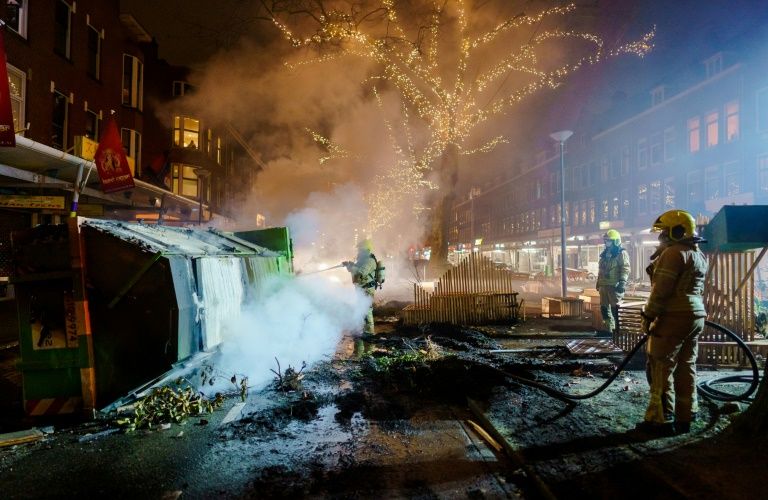Dutch riots rage on as IMF sees $22 trillion global GDP loss
Dutch police arrested at least 184 rioters in the worst unrest to hit the Netherlands in four decades
. ©ANP/AFP Marco de Swart
The Hague (AFP) – The Netherlands saw a third night of riots as coronavirus curfew frustrations boiled over, while the International Monetary Fund estimated Tuesday that the pandemic will slash $22 trillion off the global economy over five years.
With global infections fast approaching 100 million, criticism over the rollout of inoculations was also reaching fever pitch.
Tensions mounted between the European Union and pharmaceutical firms over delays to deliveries, while South African President Cyril Ramaphosa accused rich countries of bulk-buying and hoarding vaccines.
“Europe invested billions to help develop the world’s first Covid-19 vaccines,” EU chief Ursula von der Leyen told the virtual World Economic Forum (WEF). “And now, the companies must deliver. They must honour their obligations.”
Europe’s vaccination campaign stumbled after British-Swedish drugs company AstraZeneca warned it would not be able to meet promised targets on EU shipments — a week after US group Pfizer said it was also delaying delivery volumes.
In the face of a global shortage, World Health Organization experts have cautiously backed delays of second “booster” doses of the Pfizer and Moderna vaccines for up to a maximum of six weeks after the first jab in “extraordinary” cases.
German Chancellor Angela Merkel, for her part, urged a “fair” distribution of coronavirus jabs across the world, an issue that is at the top of the agenda at the WEF, which is normally held in Davos, Switzerland.
“Let’s not kid ourselves, the question of who gets which vaccine in the world will of course leave new wounds and new memories,” she told an online forum after the WHO warned that the vaccine divide between rich and poor nations was worsening by the day.
The WHO said it needed $26 billion this year for its programme aimed at speeding up the development, procurement and equitable delivery of vaccines, treatments and tests.
– ‘Don’t capitulate’ –
Meanwhile in The Hague, Dutch Finance Minister Wopke Hoekstra said the government would not back down on the curfew imposed at the weekend despite three nights of riots in a string of cities, including Amsterdam, Rotterdam and The Hague.
“You don’t capitulate to people who smash shop windows,” Hoekstra was quoted as saying by Dutch news agency ANP, calling the rioters “scum”.
Dutch police arrested at least 184 rioters in the worst unrest to hit the Netherlands in four decades.
In Australia, thousands defied coronavirus rules on Tuesday to protest against the country’s national day, held on the anniversary of British colonisation that its Indigenous population brands “Invasion Day”.
Officially recognised as Australia Day, January 26 sees annual rallies drawing attention to the injustices faced by Indigenous people.
Sounding a dire economic warning, IMF chief economist Gita Gopinath said the international crisis lender predicted a “cumulative output loss” of $22 trillion — the equivalent of the entire US economy — over 2020-25.
Nevertheless, optimism that new vaccines will bring the pandemic under control and allow economic activity to resume, coupled with stimulus in major economies, has boosted the IMF’s growth forecast this year to 5.5 percent, according to its latest World Economic Outlook.
– 2.1 million deaths –
In the United States, new President Joe Biden said mass vaccinations would become available within months.
“I feel confident that by summer we’re going to be well on our way to heading toward herd immunity,” the leader of the world’s hardest-hit country said.
But further challenges could be on the way for Biden as health authorities in Minnesota confirmed the first US case of a Brazilian variant.
The US has suffered the highest death toll with 421,134 deaths, followed by Brazil with 217,664 and India with 153,587, according to an AFP tally from official sources.
Globally, the virus has killed more than 2.1 million people since the outbreak emerged in China in December 2019.
Deaths in Mexico have passed the 150,000 mark and Indonesia has now recorded more than one million infections.
The United Nations meanwhile sounded a reminder that the virus is also taking a huge toll on global jobs.
The International Labour Organization (ILO) said losses were equivalent to 255 million full-time jobs, or “approximately four times greater than the number lost during the 2009 global financial crisis”.
Britain’s unemployment rate hit 5.0 percent at the end of 2020, the highest level for more than four-and-a-half years, as coronavirus lockdowns destroyed jobs, official data showed Tuesday.
burs/gd/mjs
Disclaimer: Validity of the above story is for 7 Days from original date of publishing. Source: AFP.


